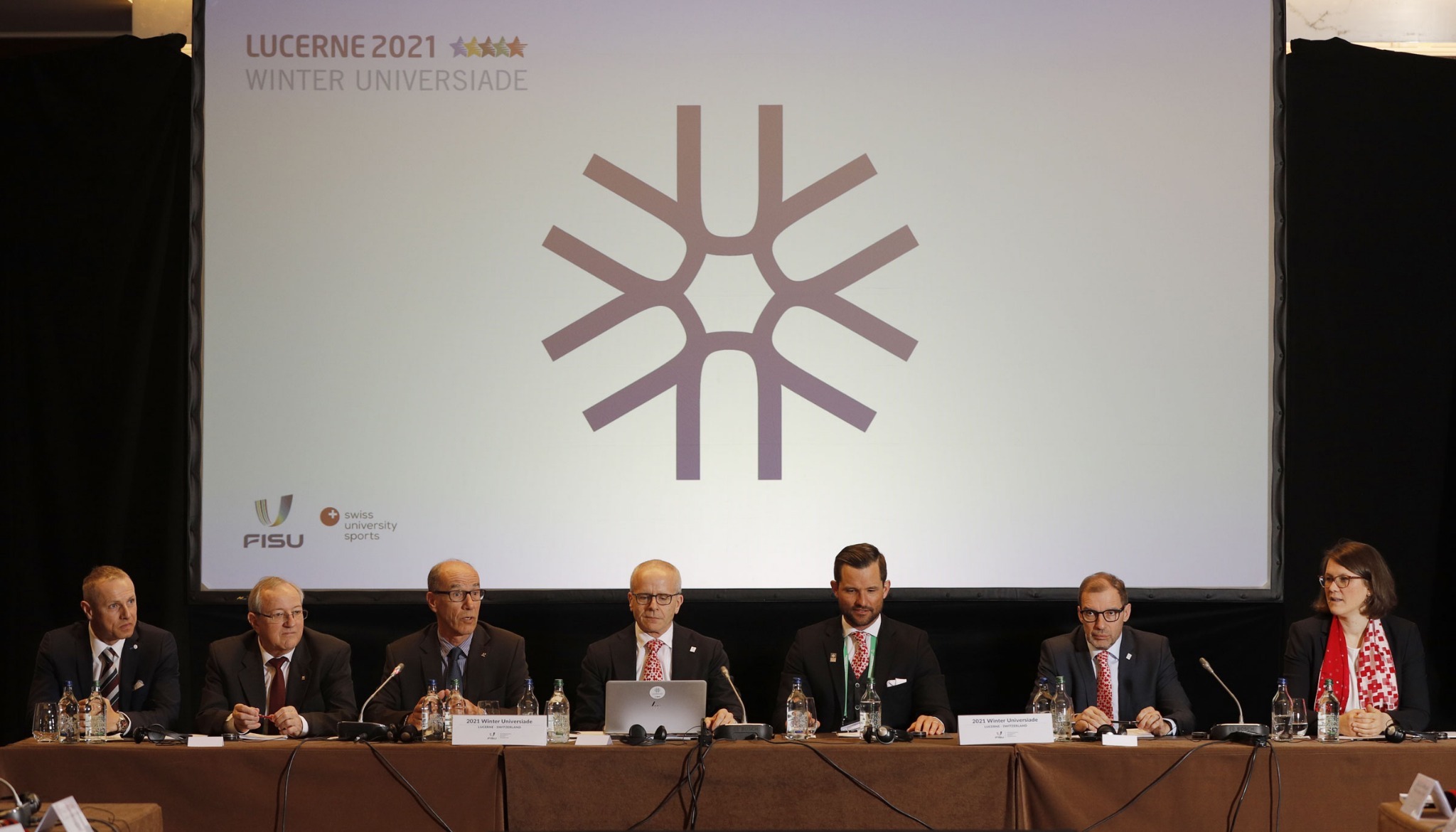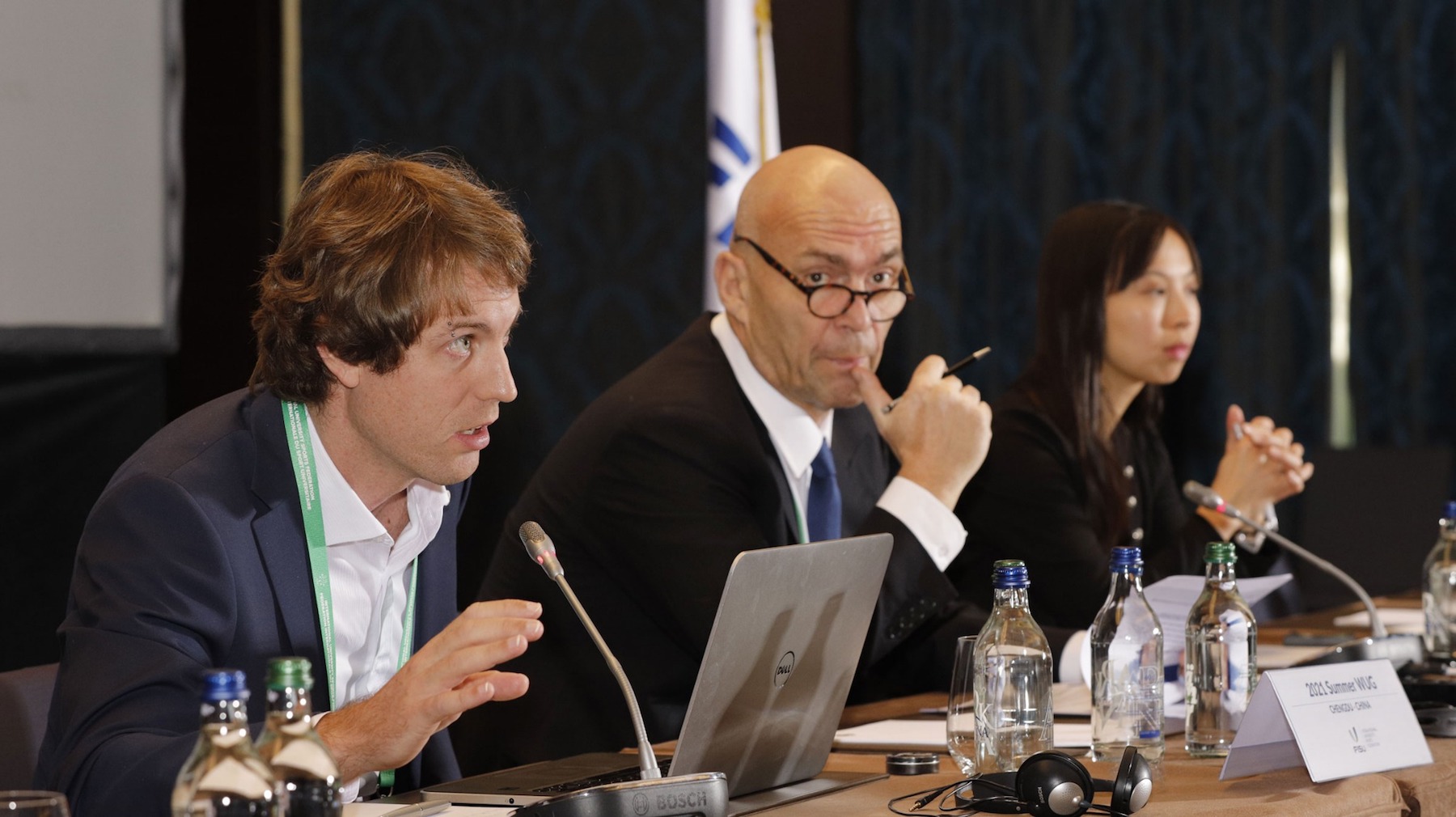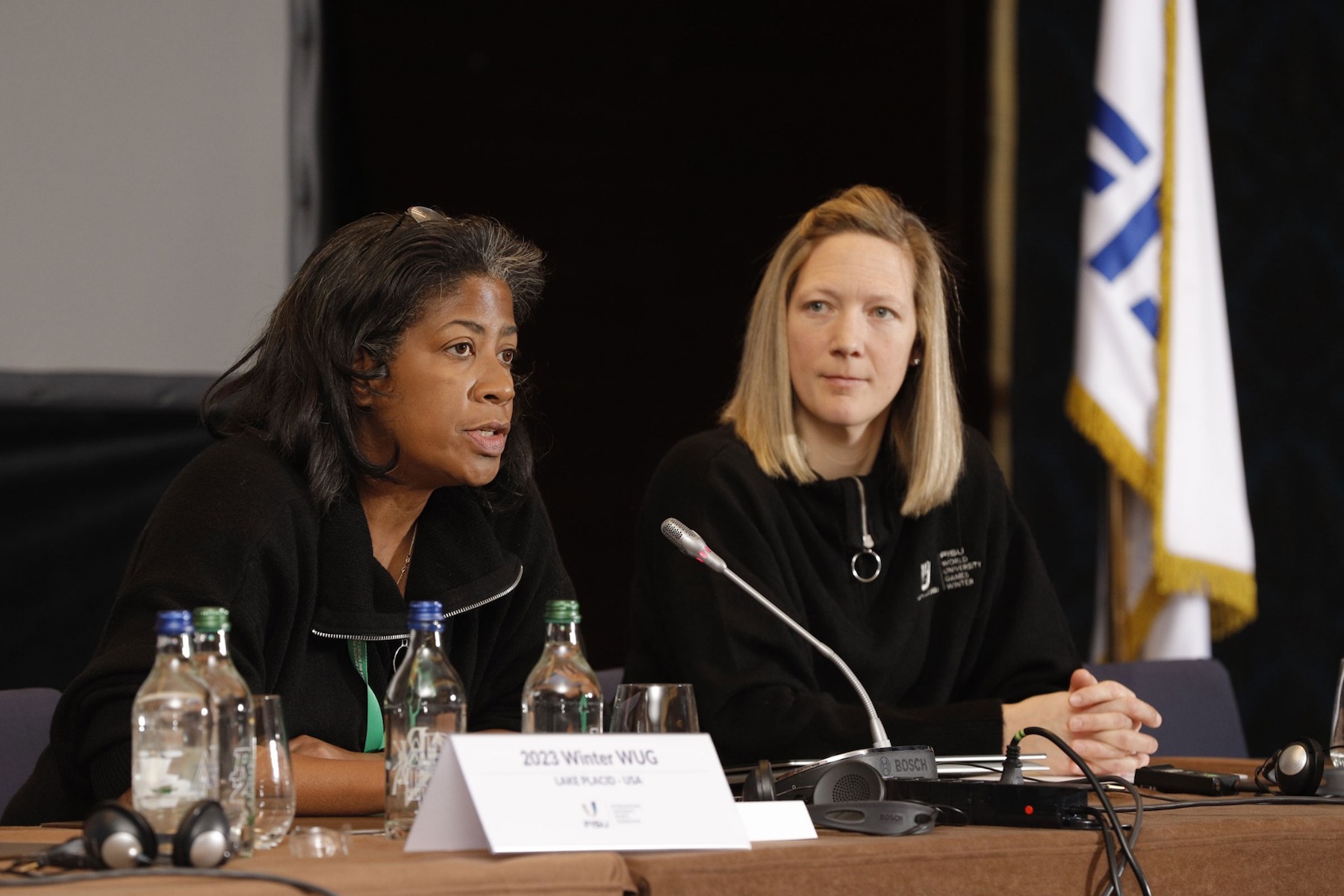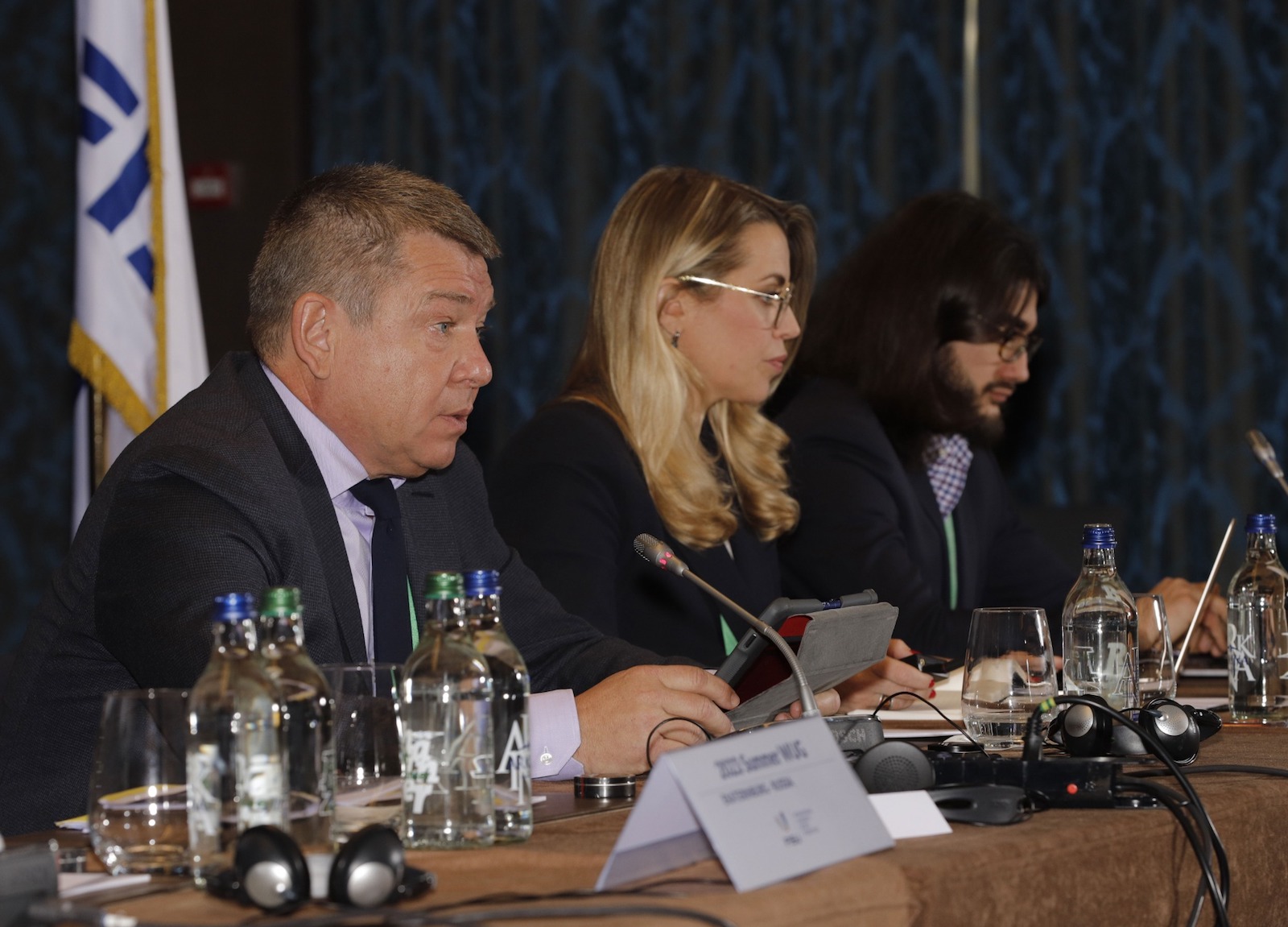The FISU Executive Committee meets on Saturday, to wrap up three days of meetings in Lausanne, Switzerland. The final day’s focus was squarely given to the hosts of the upcoming Winter Universiade and World University Games
 Progress underway in Central Switzerland for Lucerne 2021 Winter Universiade
Progress underway in Central Switzerland for Lucerne 2021 Winter Universiade
On the final day of meetings, the 30th Winter Universiade Managing Director Urs Henkeler opened the session with the organising committee’s seventh and penultimate progress report before university student-athletes take to the snow and ice in central Switzerland from 21-31 January 2021.
Lucerne’s presentation to the FISU leadership took place in the exactly one month since the conclusion of the Lausanne 2020 Winter Youth Olympic Games. This point wasn’t lost on Swiss University Sport President, Mike Kurt.
“In Switzerland, we have helped bring a new vision for the big sports events,” said Kurt. “Already, we have been quite successful in sharing what we learned from Lausanne 2020, which will allow us to be even better hosts.
“The vibes are really positive,” added Kurt. “We will bring the fire; we will bring the passion from Lausanne to Lucerne.”
In an interest to build regional stakeholder support for the Winter Universiade, the FISU Universiade flag is traversing the six Swiss cantons that will be home to the event. Lucerne 2021 representative also noted how they have been consistently pushing the unique dual-career angle of the event in their promotional efforts.
Lucerne 2021 noted they would soon announce the event host broadcaster. For timing and scoring, Winter Universiade 2021 representatives have finalised the tender process that generated several offers – all of which included a sponsorship component. The official selection will be made and announced in the coming weeks.
Residing in a winter sports hub, the Lucerne 2021 event will rely solely on existing high-quality venues. Upgrading permanent lighting in select facilities is under consideration. Lucerne 2021 representatives noted that this would both enhance the quality of the television production and leave a lasting legacy from Central Switzerland hosting the event.
At the alpine ski venue of Stoos this could include installing floodlights alongside the slope that will host the Parallel Mixed Team Event. This would allow students to train long into the night after classes end.
“Mark the 30th of January on your calendars now,” said Lucerne 2021 FISU Relations Director, Regula Schweizer. “If this takes place under the lights in Stoos, this will be definitely be a can’t miss event.”
On the promotion front, the Lucerne 2021 team will move in the next weeks from stakeholder communication to increasing event awareness. To help achieve this, Winter Universiade 2021 will have a central presence at the largest Swiss convention event in late April. The public activation will include sport simulations in short track speed skating, skiing and curling.
“We also had our one-year-to-go, where we launched Wuli, our event mascot, and held a panel discussion about advancing dual-career in Switzerland,” said Schweizer. “These events were well-received not only by the public, but by the media as well. We are sure we will be able to generate significant buzz about this great event.”
Chengdu 2021 on track, although concerns remain
 The FISU Summer World University Games department presents the progress on Chengdu 2021Due to the ongoing situation regarding the coronavirus outbreak, the progress report of Chengdu 2021 World University Games was presented on behalf of the Organising Committee by Marc Vandenplas, Director of the Summer World University Games department and his team.
The FISU Summer World University Games department presents the progress on Chengdu 2021Due to the ongoing situation regarding the coronavirus outbreak, the progress report of Chengdu 2021 World University Games was presented on behalf of the Organising Committee by Marc Vandenplas, Director of the Summer World University Games department and his team.
Vandenplas was positive that the general overview of the preparations was a positive one.
“The fact that the Games have the full support of the State Council of China, the Ministry of Education, the Ministry of Sport and the Federation of University Sports of China (FUSC) means that we are not concerned about the venue readiness or level of services,” said Vandenplas. “But we are concerned about the lack of an overall coordinator at the moment. Integration is crucial for a big event like this.”
Among the preparations that are well on track, venue construction is on schedule despite the coronavirus outbreak. In addition, the Athletes’ Village is fast taking shape as the external structure of 18 out of 22 planned buildings is finished.
Departments in 11 functional areas are in place, and a marketing, media and communication plan has been published. The Games’ slogan, emblem, mascot and official website have been launched.
Summer World University Games Deputy Director Jing Zhao presented a summary of the progress of sport delivery at Chengdu 2021.
“In Chengdu we will have 18 sports,” she confirmed. “The FUSC will appoint sports managers of seven of the sports while the rest will be appointed from the Ministry of Sport. We have received very good feedback from our Technical Committee Chairs after the first technical inspection and we are confident of the sport delivery.”
The originally planned dates of 8-19 August 2021 will be revised to 16-27 August, pending approval from the highest authorities in the People’s Republic of China.
Winter University Games 2023’s first progress report – but not the first time for Lake Placid hosting major multi-sports events
 FISU EC Member Delise O’Meally and Ashley Walden of the Lake Placid 2023 OC present the progress report With the Olympic cauldron currently burning in Lake Placid to commemorate the village has hosted the Winter Olympics 40 years ago, representatives from the Winter World University Games 2023 presented their first official progress report to FISU leadership.
FISU EC Member Delise O’Meally and Ashley Walden of the Lake Placid 2023 OC present the progress report With the Olympic cauldron currently burning in Lake Placid to commemorate the village has hosted the Winter Olympics 40 years ago, representatives from the Winter World University Games 2023 presented their first official progress report to FISU leadership.
Former Universiade competitor and current FISU Executive Committee member Delise O’Meally opened the presentation by noting the whir of excitement for sports in the heart of the Adirondacks.
“Welcome to New York. Since 1993, we have been waiting for you,” said O’Meally to conclude her opening address, a subtle nod to the American state of New York having hosted the 1993 Summer World University Games in addition to the 1973 Winter World University Games.
Lake Placid 2023 Project Director Ashley Walden presented the bulk of the progress report, which focused on finalising of the staff organisation chart, recent hirings, and updates on the venue refurbishments.
The six venues used during the 1980 Winter Olympics will comprise the 2023 competition venues. All six sporting centres are currently undergoing revitalisation efforts to ensure top-notch competitions for student-athletes. As a winter sports hub that is home to a United States Olympic Training Center, area enhancements are sure to leave a long-lasting event effort to the village and surrounding region, Lake Placid 2023 representatives emphasized.
On the workforce front, Lake Placid 2023 is currently hiring for the positions of head of sport and director of marketing. “The Winter World University Games is a brand we are invested in growing in the United States and Canada,” said Walden.
The confirmed point of arrival and departure for the Games will be Plattsburgh International Airport. The organisers will also provide logistical support for teams wishing to arrive at the Montreal-Trudeau International Airport and John F. Kennedy International Airport.
“The State of New York is fully behind us, and by making Plattsburg the official point of entry, will ensure we have more international flights into this airport.”
The Lake Placid 2023 team requested the addition of Long Track Speed Skating, Nordic Combined, and Ski Jumping as optional events to the Winter WUG 2023 programme. The FISU Executive Committee unanimously approved adding all three to the event’s competition.
Lake Placid organisers noted the importance of this to the local community – and to continuing the tradition
“The Lake Placid Olympic Ice Oval plays a central role in our community,” said Walden. “From the 1932 Games to Eric Heiden’s historic five gold medal haul in 1980, the sport and this venue is part of our city’s sport legacy. We would be remiss not to include this for our second hosting of the Winter World University Games.”
Snowsports also play a starring role in Lake Placid. And in Lake Placid, many of the United States’ top winter sports performers complete their preparations for the international stage in the area.
“Many of the best U.S. athletes call the Lake Placid home, either where they grew up or as part of the national development programmes, like Nordic Combined has,” Walden said. “Renovating the ski tracks and adding frost rails to the ski jumping venue will make this an even better world-class, four-season training venue for our U.S. winter sports athletes.”
Added Walden: “Having the Winter University Games coming to town will give them a target for their ambitions as student-athletes in the competition arena.”
Ekaterinburg 2023 impresses with progress report
 Alexander Chernov, CEO of Ekaterinburg 2023 brought the FISU Executive Committee up to speed with the progress on the Summer World University Games of 2023. Chernov outlined the current state of affairs in various areas including the masterplan, budgetary planning, and workforce planning.
Alexander Chernov, CEO of Ekaterinburg 2023 brought the FISU Executive Committee up to speed with the progress on the Summer World University Games of 2023. Chernov outlined the current state of affairs in various areas including the masterplan, budgetary planning, and workforce planning.
Chernov highlighted the ongoing mascot contest that is being held as a nationwide vote. More than 68,000 people have already voted for the mascot on the official website. This contest will run till May 2020, when the final stages will be held, and a mascot will be chosen for the 32nd edition of the Summer World University Games.
“We have had three inspection visits so far,” Chernov continued, commenting on the ongoing collaboration with the FISU World University Games department. “We have revised and adjusted some of our plans accordingly and have already submitted the first draft of the masterplan at the end of 2019.”
The summary of the venues was also presented, with 24 out of 33 venues being existing ones for which renovation plans are ready. Among the new venues are the competition venues for six sports, which will be adjacent to the Athletes’ Village.
“We are very happy with the collaboration with the Organising Committee of Ekaterinburg,” said Summer World University Games Director Marc Vandenplas. “We have some challenges, such as the village being a really large project. However, the concept of the village is really very good because many sports will take place right at the periphery. That is indeed a very strong point.”
Another strong point was the cultural concept presented that will be an integral part of the World University Games. The cultural activities will run parallel to the games and the participants will in fact also take part in the delegations’ parade.
Roundtables Report
For the first time, FISU held three round table events centred around three pressing issues in the world of sport: sustainable development, ethics and government, and university relations.

1. Sustainable Development
Sport can enhance the sustainable development of cities by building facilities with the most enhanced resource and energy efficiency. Sport can also promote sustainable consumption and production through education and awareness raising campaigns. And, sport can drive sustainable development further by improving policies and procedures with procurement standards. In short, the potential for sport to be an agent of change in the field of sustainable development is limited by little more than ambition.
The FISU sustainable roundtable led by FISU Executive Committee member Martin Doulton and FISU Staff member Sameer Janmohamed generated over 60 recommendations. Now, the group will go from the drawing board to refine their brainstorming session into the first steps of action the university sports movement should take to enhance sustainability.
2. ETHICS AND GOOD GOVERNANCE
FISU Senior Executive Committee member Verena Burk and Director-General Paulo Ferreira led the Ethics and Governance Roundtable. The table examined existing definitions of good governance and agreed that FISU will work on and implement its own definition.
“We also discussed the core principles of good governance,” said Ferreira. “We identified where these core principles would apply at various levels, from administration to membership and staff.”
The roundtable discussed application of these concepts, specifically identifying the tools that are missing.
“We looked at some resources that already exist in FISU,” said Dr. Burk. “We already have our Statues and Internal Regulations, as well as our Global Strategy and Code of Ethics. All our reports are also resources for good governance inside FISU. We have to identify what tools are missing and what we should develop.”
The final point at the roundtable centred around the implementation of policies and encouragement of best practices, through the formation of a working group that will continue to develop these concepts.
3. UNIVERSITY RELATIONS
If FISU and its member associations do not reach universities – and thereby, the university students themselves – the movement is missing the mark in its mission to enhance sporting activities among students. That is the vexing question the university relations group grappled with during the roundtable event.
The outcome of the conversation? “Getting the non-active NUSFs to become active is our biggest challenge,” said FISU Executive Committee member Byong Jin You to the constituency. ” “FISU must communicate directly on the campus, to the students and the academics.”
The university relations group noted additional FISU efforts underway. “The upcoming FISU Healthy Campus project and the recent FISU Rectors Academic Advisory Board are good first steps to making this happen,” said You.
PARTING WORDS ON THE ROUNDTABLE FROM THE FISU PRESIDENT
“As a committee we’ve taken a small but significant step today,” said FISU President Oleg Matytsin. “We are a strategic entity, not just an advisory body. We have to look to the future, and in doing so, with a strategic view.
“When we communicate, we communicate together,” added President Matytsin. “Now, from the thoughts generated and ideas captured from these roundtables, we will turn these into real steps and actions to take.”